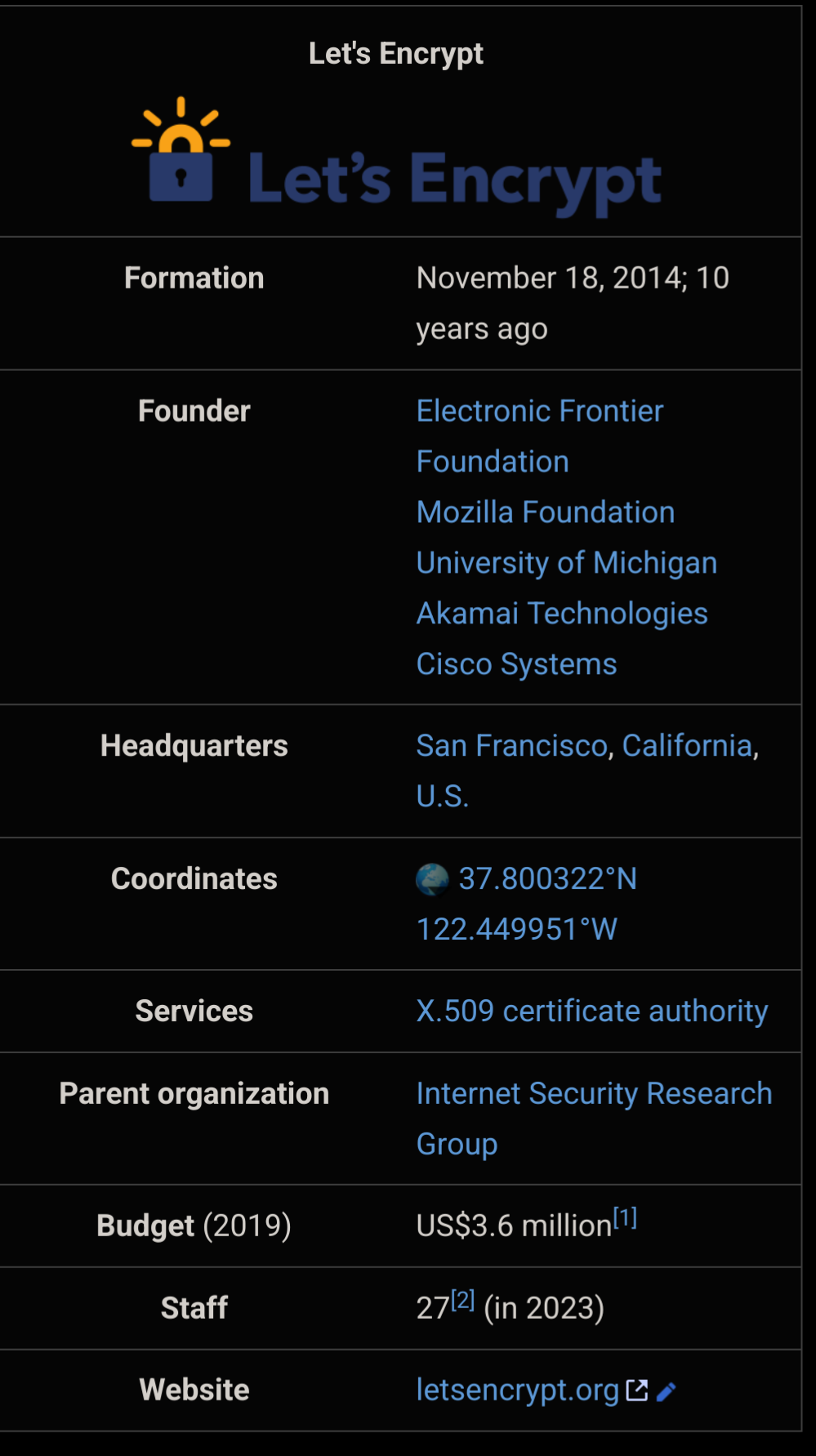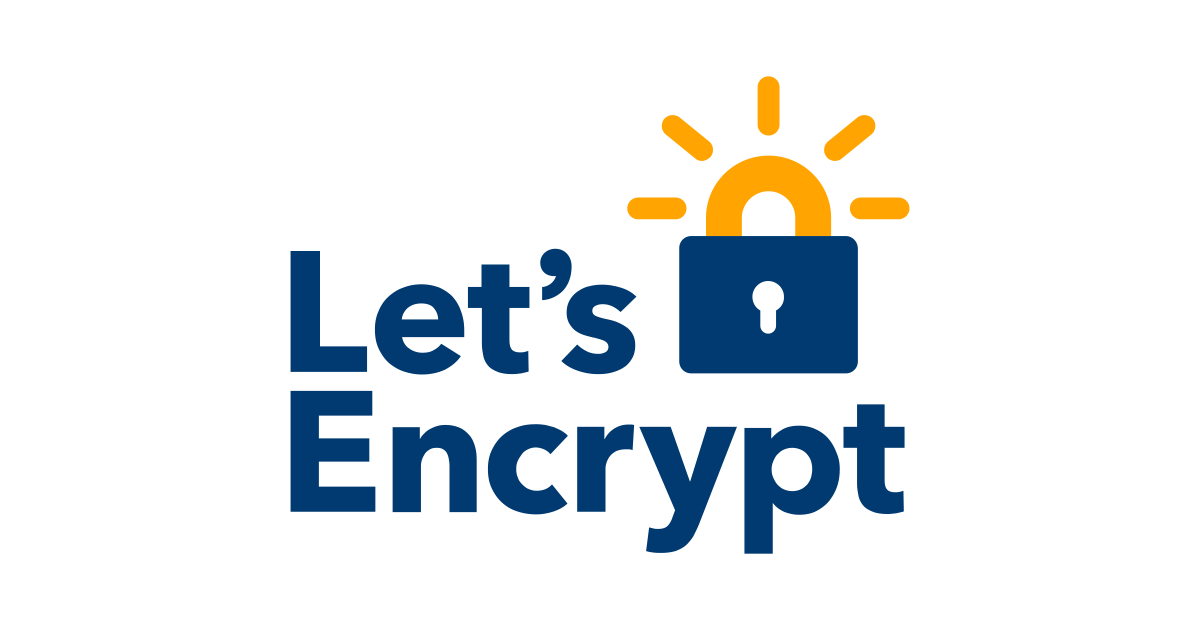- cross-posted to:
- selfhosted@lemmy.world
- technology@beehaw.org
- cross-posted to:
- selfhosted@lemmy.world
- technology@beehaw.org
Happy birthday to Let’s Encrypt !
Huge thanks to everyone involved in making HTTPS available to everyone for free !

I worked for a company we had 300 websites, the boss wanted to buy certs. I told him about Lets Encrypt. He loved the idea it saved us a bunch of money. I suggest we donate $100 to them. Hes says “NO F-ing way!”.
A client of mine pays for an SSL cert he doesn’t even use. I’ve told him before I moved him to Let’s Encrypt because I was able to automate the renew process. He decided he needed to continue paying for the SSL cert. I told him we are not using it, but he doesn’t believe me. So he continues to pay for it.
TLS certificates have huge margins, so web hosts love selling them.
I love it when companies are too stubborn to update their costs despite the necessity changing over the years.
My previous employment kept buying microsoft office license keys despite us already moving to 365. They probably did it out of habit when buying new computers. Needless to say I have a cardstack of license keys at home lol. Granted it’s for Office 2013 but I don’t really need the latest version for basic document processing.
Private sector is more efficient my ass
SSL Certs were so god awful before certbot that it’s hard to explain now that it’s so easy and free.
Also fucking expensive
And it changed the Internet, for good and a lot.
Just two months ago, a security team member dinged one of our services for using Lets Encrypt, as “it’s not as secure as a traditional CA”.
I’d love for them to explain how, if anything the short cert validity and constant re-checking of the domain seems more secure than traditional CAs
I’d also argue that the fact that it’s 100% automated and their software is open source makes it objectively more secure. On the issuing side, there’s no room for human error, social engineering, etc.
It’s sad that these arguments are still being shared. It was the same arguments years ago from people that would just assume that a free cert was inherently unsafe.
Damn! That’s definitely a “I’m old” moment for me. I still remember when I first heard about the concept and I remember setting it up the first time on a self hosted project (which seemed harder back then).
Awesome project!
Lol I instinctively freaked out when I saw the post preview assuming it was going to be a post about a major data breach or exploit of some sort relating to Let’s Encrypt.
I probably need more positivity in my life 😂
It doesn’t say on the website but on their anniversary day they are giving away unlimited ssl certs!
Well, they do rate limit
And my parents still buy SSL certs because that’s just what they know 🤢
My last cert renewal was $20 for 3 years. That’s less than a dollar a month, not exactly breaking the bank.
It’s been a bit since I’ve asked them, but they certainly complained about the cost before. Almost as much as the hosting itself for sure.
Lots of people shitting on stories of people who buy certs.
You do still have to buy a cert if you want one for a .onion. Let’s encrypt still doesn’t support it :(
But…an onion address doesn’t need a cert?
Some apps refuse to work if you dont have TLS, so it depends what you’re running
I’m also having to manually cert every 3 months for my emby instance. It’s a minor inconvenience, but I’m definitely tempted to just buy a yearly.
Why not script it so you don’t have to do it manually?
Your advice is sound, my ability to focus on such a task however… lol
what about certbot?
Emby?
Same idea as Jellyfin / Plex. Self hosted media server. Plex handles ssl certs for you, Emby doesn’t have an automatic process so I’m having to manually replace it every 90 days
Might be less effort for you to submit a PR
Huge impact on a tiny budget - that’s extremely impressive. The world could be so much better without rent seeking parasites.
Let’s Encrypt is amazing, but are there any equally trustworthy alternatives people could switch to if something bad happens to it?
ZeroSSL, plus a few paid companies support ACME (I know Sectigo and GoDaddy do). Sure, the latter are paid services, but in theory you can switch to them and use the exact same setup you’re currently using with Let’s Encrypt, just with some config changes.
They came up with the ACME protocol, so presumably somebody could. The real barrier to entry is the cost of getting into that certificate chain of trust. I have no idea why it’s so difficult and expensive.
Well, it’s difficult, as it should be, because if you control a certificate in the active chain of trust of browsers, you can hack pretty much anything you want.
Correct me if I’m wrong, but isn’t the CA only signing your public key to prove identity/authority? I don’t think the CA can magically MITM every cert they sign.
The impact is not serious enough to warrant a $1m entry fee, IMO. At best, someone could impersonate a site. They’d also have to get other things in line (e.g. DNS hijacking) to be at all successful anyway. And it’s not like most people are authenticating certs themselves. They just trust browsers to trust CAs that vouch for you and prevents those scary browser warnings.
It doesn’t improve encryption compared to a self-signed cert though.
If you are the CA, you can sign a new certificate yourself for google.com and the browser will accept it. It’s effectively allows MITM for any certificate. Worse, it’s not even limited to certificates under that CA. The browser has no way of knowing there’s 2 “valid” certs at once, and in fact that is allowed regardless (multiple servers with different instances of the SSL cert is a possibility).
Certificate pinning might save things, since that will force the same certificate as was previously used, but I’m not sure this is a common default.
If it begins to enshitify, someone will quickly take up the helm. It’s become so core now that someone like Cloudflare would just be like “We do this now.”
I think Cloudflare enshittifying is a bigger risk that Let’s Encrypt.
Maybe ZeroSSL
Can anyone fill me on this? Why is it so significant?
HTTPS certs used to be very expensive and technically complicated, making it out of reach for most smaller orgs. Let’s Encrypt brought easy mass adoption and changed encryption availability on the web for everyone.
They also made it a open protocol (the ACME protocol), so now there’s a bunch of certificate providers that implement the same protocol and thus can work with the same client apps (Certbot, acme.sh, etc). I know Sectigo and GoDaddy support ACME at least. So even if you don’t use Let’s Encrypt, you can still benefit from their work.
It is the free, easy way to get an SSL cert (plus automated renewals). Without it, maybe HTTPS wouldn’t have been so omnipresent.
And it shouldn’t have been, SSL PKI is an intentionally rigged architecture. It’s intended for nation-states to be able to abuse it.
I’d like much more some kind of overlay encryption over HTTP based on web of trust and what not. Like those distributed imageboards people were trying to make with steganography in emotion.
It’s a trap. Everybody is already in it and it has already been activated, so - the discussion would be of historical interest only.
Underrated. Stuff rocks.
That’s very great news! Thank you for all the good work!












